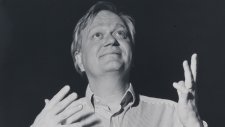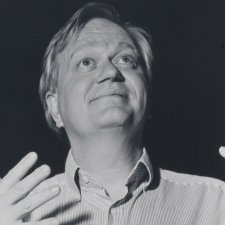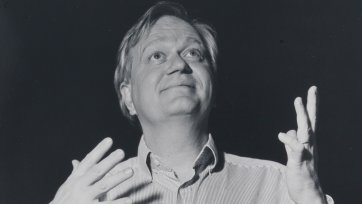- Alright. My father, doing his PhD, took a lot of time taking care of me and taking care of me meant I went to the lab with him while he was doing his work on rainbow trout and other fish and I could see the passion and the love that my father had for science, we used to do things all the time, I remember he would drive down the road and I would put a butterfly net out and we would scoop up bugs for one of his classes and there would be all sorts of amazing things in a butterfly net when you put it through a ditch at 30 miles an hour and so that was just part of my life and so from the age of about three, I knew I wanted to do science.
When you win a Nobel prize, it's not like you know it's gonna happen, in my case, I got a call at 8:39p.m. on the 4th of October, 2011, I was in the kitchen helping make dinner, my wife says I wasn't helping that much but I don't remember and she actually got the call, the phone call, said, it's for you. The person said, this is a very important call from Sweden, is this Brian Schmidt? And I said, yes. And I said, I don't know what this is, I was thinking it might have been a practical joke by one of my students. The Academy got on and told you you win it and they said, we're announcing it in six minutes, will you stay on the line, and I said, okay. And then all hell breaks loose, suddenly I get to meet the Prime Minister the next day, end up at a state dinner with Barack Obama, two weeks later, end up in the Oval Office six weeks later on the way to Stockholm and I think it's important to realise, it's a celebration not of individuals though we tend to focus on that but it's actually a celebration of science.
This is a replica, the box is the original, the real one's in Questicon because they're quite valuable and the University kinda wanted me to have it locked up so I said, well, let's lock it up in the place where people can see it, and as I said, it is a celebration of a science, I think for all of Australia, Australia allowed me as an immigrant to come in and do great things and I think it's important for people to realise it's theirs as well. No one ever looks at the back but I actually think the back is much prettier, so there's natur and sciencia, the Greek goddesses, science and nature there in the back.
You have to be really self-motivated, you have to really wanna know, wanna understand, you like to, you have to be prepared to work on things for a long time and not get an answer and then suddenly have it appear. You have to be able to fail at stuff, you do things that are really hard, no one's ever done before, and sometimes it doesn't work out and you have this amazingly open-ended creativity, people don't think of science as creative, it's incredibly creative, and indeed, if you're not creative, you're not gonna survive as a scientist, you have to be able to invent and do new things, it's not just doing the old stuff. It's almost like being an artist, you don't know where you're gonna end up, you have to sort of follow your nose and use all of these tools to find and discover things no one's ever done before. Doing research is about learning to think, learning to do, and to solve problems, and what in life is not about solving problems? You have to identify what's important and you have to realise that there's only 24 hours in a day and I always tell people, I need seven hours of sleep, so I try to stick to the basics and saying, I have to be human and I have to perform well, it's a matter of literally sitting down and saying, these are the highest priority activities, throwing a few things in that are just fun, taking time off, because if I don't, I know I will perform poorly on Monday and I know my family will suffer and I know I will suffer so you gotta know yourself.









